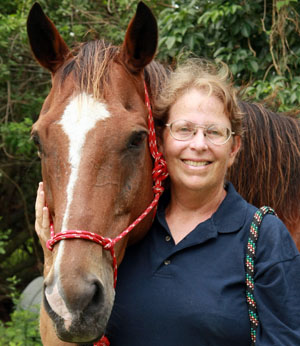TAILS FROM THE TRAILS
Imagine a classroom. Any classroom. Picture the teacher entering on the first day. What’s her mood? Excited to be there? Telling a joke to ease the tension before introducing herself and the subject? Resigned to yet another room full of kids? Annoyed at something that happened earlier in the day? Bored to tears?
What’s her demeanor? Does she smile? Frown? Nervously fiddle with things on her desk? Is her voice loud and sharp? Does she look tense? Relaxed? Does she stand still at the front of the room? Move around between desks?
How does the teacher’s frame of mind and deportment affect you, the student?
Now imagine entering your horse’s domain, the place he considers his home, whether stall or pasture.
Are you glad to see him? Can’t wait to start riding and do all the fun stuff? Tired from a day at work but trudging through your chores, which include caring for the horse? Angry at something that happened prior to your visit to the barn? Worried he’s looking a bit too fresh? Rushing to get things done because you’re late for something else?
How does your frame of mind and deportment affect your horse?
Take a minute to really picture these two scenarios, and you’ll quickly realize that how we present ourselves to others, especially highly perceptive horses, influences the entire relationship. This is where the clinic comes in that I’m about to introduce you to.
One day not too long ago, while chatting with Acreage Horseman’s Association President Linda Rainbolt, we got to talking about clinics. The AHA offers occasional clinics at Nicole Hornstein Equestrian Park in The Acreage, generally free to anyone. You don’t even have to have a horse or be an AHA member. They’re nice ways for people to get together, meet and mingle, maybe pick up a few pointers.
“We could use a few more clinics,” Linda said.
“I’d be glad to teach one,” I heard myself say.
“Really? That would be great,” she quickly responded. “On what topic?”
“I could teach a bunch of different things…”
I thought of all the stuff people might be interested in, then thought of something else. What would the horses like to see?
“How about groundwork, all the stuff everyone sort of rushes through to get to the riding?” I replied. “I don’t think people always know how important the groundwork is in setting the whole tone for the ride.”
“Perfect,” Linda pronounced.
And, just like that, it was a done deal. I agreed to present a free clinic, “Groundwork from the Horse’s Perspective,” at Nicole Hornstein Equestrian Park in The Acreage a week from Sunday, on Aug. 18, from 10 a.m. to noon.
I made a list of things I wanted to cover. Some of it sounded more like Zen than horsemanship, but the two aren’t that far apart.
Mood matters when you’re around horses. They notice everything: muscle tone, eye contact, how you move, tone of voice, loudness, even your smell.
Yes, how you smell forms your horse’s opinion of you!
Everyone knows how well horses hear and see, but their sense of smell is equally important. I once had a horse who gravely distrusted all humans. It was a seriously disturbed horse. Know how we finally bonded? One day I was out with him, wearing a T-shirt, shorts and flip-flops. As I finger-combed his mane, he dropped his head and started smelling my feet.
This is odd, I thought.
He took deep, deep breaths, moving from one foot to the other. Then he turned and regarded me, and he was smiling. I have no idea what that was about, but after that day, he lost his fear of me. And he always smelled my feet — every day. Sometimes I just walked out into the pasture so he could come over and sniff my feet.
And yes, I do wash my feet.
How you approach a horse, where you stand, your rate of breathing — all of it matters. All of it makes a difference to the horse.
Back to that imaginary classroom for a second. Which teacher would you rather have: one who has an agenda firmly entrenched in her mind before she opens her mouth, refusing to deviate one iota from that rigid standard? Or one who listens to her students and lets their interests and needs influence and inform the curriculum?
Are you concentrating on the horse when you‘re with him, or living in your head? Paying attention to what you want to happen, or assessing what the horse wants?
Did you know that it matters to your horse whether you offer your hand palm-up or palm-down?
Horses live in the minute, the now. Changing small things, doing things subtly that make sense to the horse, inviting him to participate, fostering mutual respect — who wouldn’t want this? That’s pretty much the basis of this clinic.
Some of the specific exercises I’ll show you: how to bridle a horse so it’s more like a caress, how to groom so your horse gets a massage while getting clean, how to choose the right song for your horse and establishing a routine that allows you and your horse to relax and gain confidence.
I look forward to meeting many of you there, with or without your horse. You don’t need any special equipment, and you can be any level of rider. I hope you’ll gain a few insights, which might result in a happier horse.
This free clinic will be Sunday, Aug. 18, from 10 a.m. to noon at Nicole Hornstein Equestrian Park in The Acreage. For more information, call (561) 793-8075.








